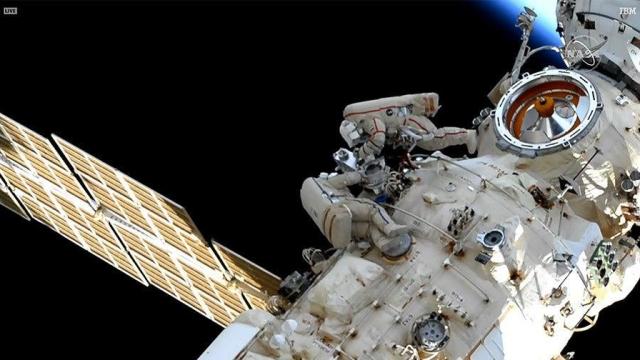Russia’s Nauka module sprung a leak on Monday in the latest incident of faulty hardware on board the International Space Station (ISS).
Flight controllers at NASA’s mission control noticed Nauka’s backup radiator, which is mounted to the outside of the module, was leaking coolant at approximately 1:00 p.m. ET on October 9, the space agency wrote in a blog post. Using cameras on the exterior of the ISS, the flight controllers saw flakes coming from one of the two radiators on the multipurpose laboratory module.
The ground control team asked the crew on board the ISS to look outside for signs of the flakes, according to CBS News reporter William Harwood. “NASA astronaut Jasmin Moghbeli confirmed the presence of the flakes from the cupola windows, after which the crew was asked to close the shutters on U.S. segment windows as a precaution against contamination,” NASA wrote, adding that the crew is not in any danger.
Roscosmos later confirmed that the leak was coming from Nauka’s backup radiator, according to NASA. Crew members installed the Nauka module on the ISS in July 2021, while the backup radiator was transferred to the module in April during a Roscosmos spacewalk. The main radiator, which is used to cool the module, is still working normally.
This marks the third coolant leak incident traced back to Russian hardware in low Earth orbit. In December 2022, ground teams observed a fountain of particles pouring out from a Soyuz spacecraft docked to the ISS. The spacecraft carried NASA astronaut Frank Rubio and Roscosmos cosmonauts Sergey Prokopyev and Dmitri Petelin to the ISS in September 2022, and was supposed to transport them back home in the spring of this year. Due to the leak, however, the trio’s stint on the ISS was extended by another six months.
Shortly after, a Russian Progress 82 freighter docked to the ISS also began leaking coolant in February. Russia attributed the first leak to a micrometeorite strike on the spacecraft. However, after the second coolant leak, suspicions arose that it might be related to faulty manufacturing. Now with a third incident in the books, it’s becoming more evident that it’s an issue with the Russian hardware itself.
Ground teams are still investigating the latest incident, but for now, NASA says it has no impact on the crew or ISS operations.
